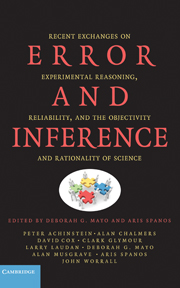 Error and Inference
Error and Inference Published online by Cambridge University Press: 29 January 2010
Philosophy of Science: Problems and Prospects
Methodological discussions in science have become increasingly common since the 1990s, particularly in fields such as economics, ecology, psychology, epidemiology, and several interdisciplinary domains – indeed in areas most faced with limited data, error, and noise. Contributors to collections on research methods, at least at some point, try to ponder, grapple with, or reflect on general issues of knowledge, inductive inference, or method. To varying degrees, such work may allude to philosophies of theory testing and theory change and philosophies of confirmation and testing (e.g., Popper, Carnap, Kuhn, Lakatos, Mill, Peirce, Fisher, Neyman-Pearson, and Bayesian statistics). However, the different philosophical “schools” tend to be regarded as static systems whose connections to the day-to-day questions about how to obtain reliable knowledge are largely metaphorical. Scientists might “sign up for” some thesis of Popper or Mill or Lakatos or others, but none of these classic philosophical approaches – at least as they are typically presented – provides an appropriate framework to address the numerous questions about the legitimacy of an approach or method.
Methodological discussions in science have also become increasingly sophisticated; and the more sophisticated they have become, the more they have encountered the problems of and challenges to traditional philosophical positions. The unintended consequence is that the influence of philosophy of science on methodological practice has been largely negative.
To save this book to your Kindle, first ensure [email protected] is added to your Approved Personal Document E-mail List under your Personal Document Settings on the Manage Your Content and Devices page of your Amazon account. Then enter the ‘name’ part of your Kindle email address below. Find out more about saving to your Kindle.
Note you can select to save to either the @free.kindle.com or @kindle.com variations. ‘@free.kindle.com’ emails are free but can only be saved to your device when it is connected to wi-fi. ‘@kindle.com’ emails can be delivered even when you are not connected to wi-fi, but note that service fees apply.
Find out more about the Kindle Personal Document Service.
To save content items to your account, please confirm that you agree to abide by our usage policies. If this is the first time you use this feature, you will be asked to authorise Cambridge Core to connect with your account. Find out more about saving content to Dropbox.
To save content items to your account, please confirm that you agree to abide by our usage policies. If this is the first time you use this feature, you will be asked to authorise Cambridge Core to connect with your account. Find out more about saving content to Google Drive.